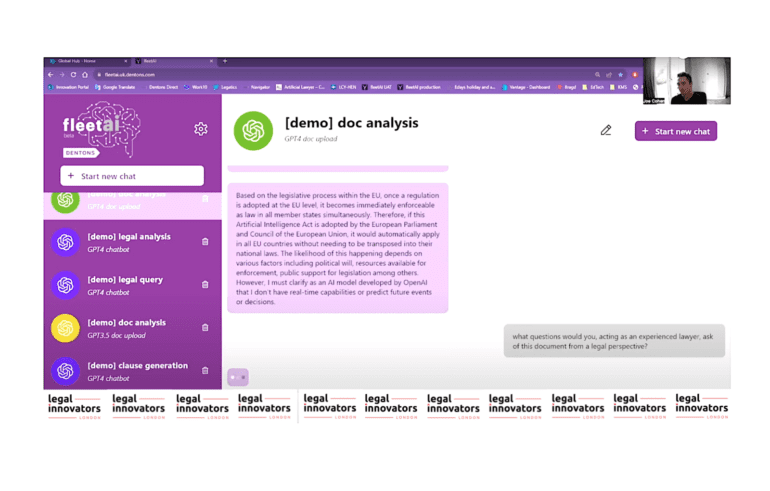TL;DR:
- Dentons’ fleetAI, a leading generative AI tool in the legal sector, is poised for global client licensing.
- Head of Innovation, Joe Cohen, showcases its features, including document analysis and clause generation.
- fleetAI has witnessed rapid adoption among lawyers, making it a standout legal tech product.
- It was developed in collaboration with Springbok.ai consultancy.
- The technology offers the potential to revolutionize client billing and reduce certain legal costs.
- Integration with Dentons’ knowledge management system is on the horizon.
- Despite its early-stage application, fleetAI marks a significant milestone in embracing LLM technology.
- Dentons’ pioneering role sets a compelling precedent for AI adoption in the legal market.
Main AI News:
Dentons, a global legal powerhouse, is at the forefront of the legal sector’s foray into generative AI, exemplified by their innovative product fleetAI. This cutting-edge technology is set to revolutionize legal practice and will soon be available to Dentons’ clients worldwide. In this exclusive Product Walk Through, Joe Cohen, Head of Innovation, offers a comprehensive overview of fleetAI’s capabilities, including document summarization, comprehensive document analysis, and dynamic clause generation. Joining him in this exploration is Richard Tromans, the founder of Artificial Lawyer, as they delve into the future prospects and limitations of this game-changing tool.
fleetAI has rapidly gained traction within Dentons, with hundreds of lawyers already harnessing its power. Developed in collaboration with Springbok.ai consultancy, this generative AI platform promises to redefine legal work processes. Here are some key highlights:
- Document Transformation: FleetAI enables users to upload documents, such as a list of amendments to the EU Parliament’s AI Act. It then performs a series of tasks, including the ability to ask relevant questions and even suggest the questions an LLM (Legal Learning Machine) should pose.
- Billing Transformation: The adoption of this technology prompts the question of how it might revolutionize client billing methods, potentially reducing costs for certain types of legal work.
- Template Augmentation: Explore the possibility of taking a legal template and enhancing it with fleetAI’s capabilities.
- Training Data Clarification: Joe delves into what constitutes ‘training data’ for an LLM, shedding light on this crucial aspect.
- Lease Report Integration: Dentons has plans to incorporate a lease report functionality into fleetAI, broadening its utility.
- System Prompts and Data Handling: Other topics under scrutiny include the utilization of system prompts, data retention policies, and the data sources employed by the LLM.
- Chunking and Thoroughness: Joe discusses the concept of ‘chunking’ and the challenge of maintaining thoroughness, especially when processing extensive documents, emphasizing the importance of breaking down long uploads into manageable segments.
- Capabilities and Limitations: fleetAI’s strengths and weaknesses are examined, with particular attention to its suitability for predicting outcomes based on uploaded documents.
- Integration Challenges: The conversation extends to the integration of fleetAI into Dentons’ internal knowledge management system and the complexities associated with connecting to client data.
It’s essential to note that while fleetAI employs GPT-4 at its core with customized prompts and a secure Dentons-specific interface, this is just the beginning. As Joe emphasizes, Dentons has ambitious plans for the future, including the development of lease reports functionality. This milestone marks a significant stride as a major law firm embraces LLM technology at its core, yielding positive outcomes. It’s worth remembering that this technology was scarcely on the radar for most lawyers just a year ago, making Dentons’ pioneering initiative all the more noteworthy. In this evolving landscape, Dentons leads the way, setting a compelling precedent for the legal industry’s adoption of AI-powered tools.
Conclusion:
Dentons’ fleetAI represents a pivotal moment in the legal industry’s adoption of generative AI. With its imminent global client licensing and the promise of reshaping legal work processes, it underscores the potential for AI-powered tools to revolutionize the legal market. Dentons’ proactive approach sets a compelling example for other firms to follow in integrating AI technology into their core operations.

